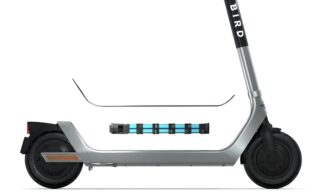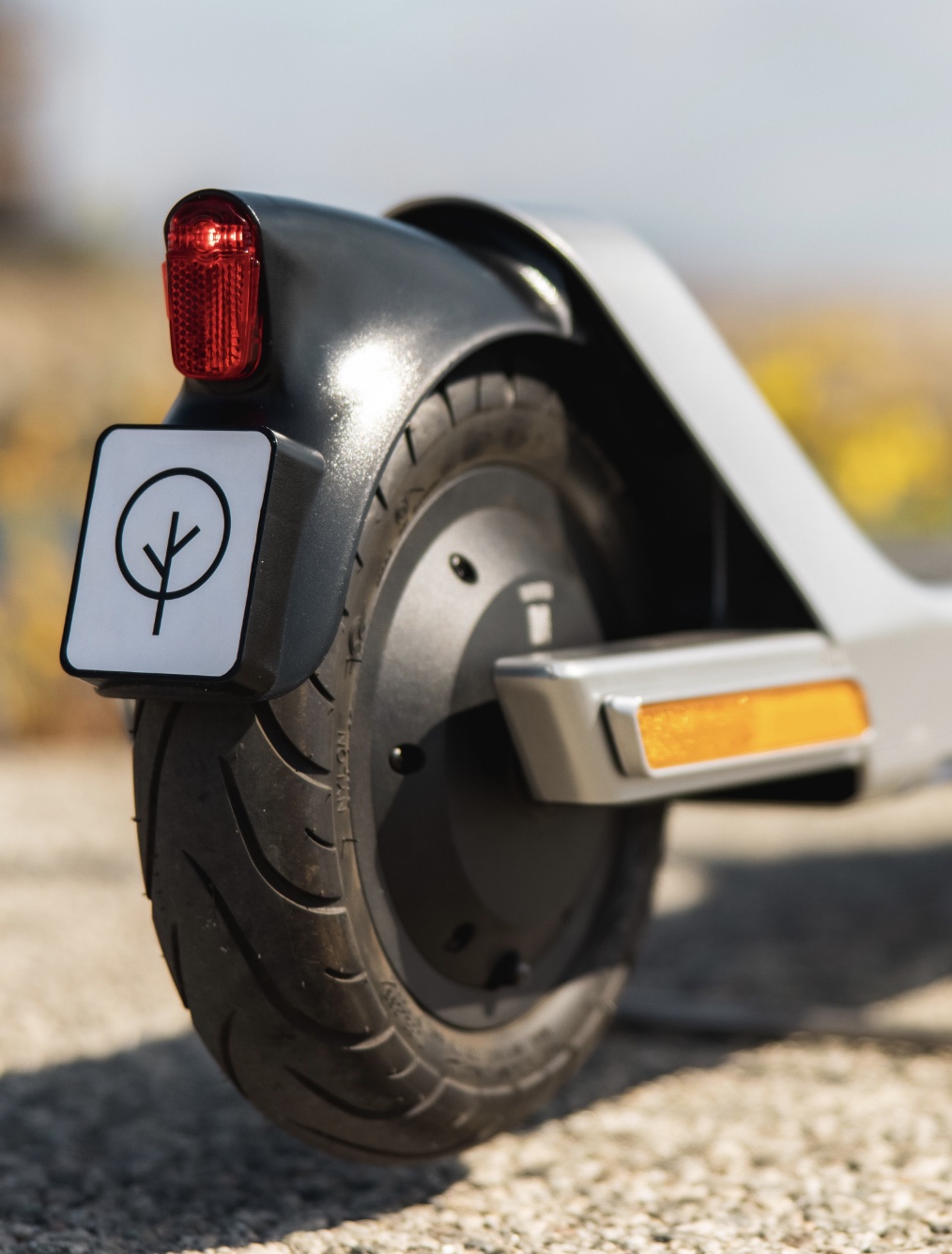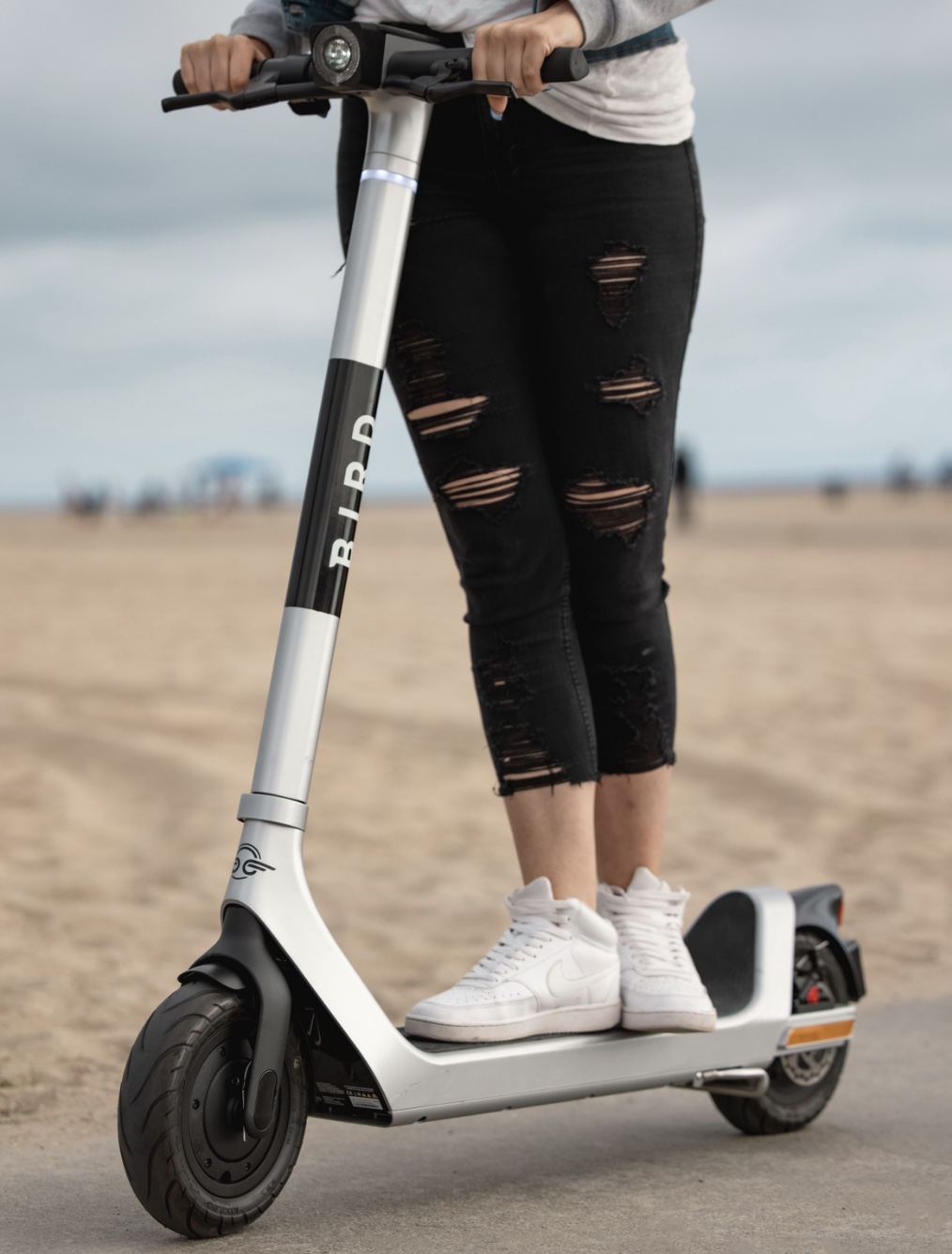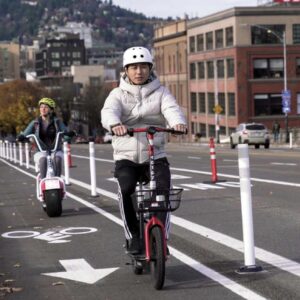Bird has upgraded their fleet of electric-scooters in Portland to their new “Bird Three” model and they’re so sure you’ll love them they’re hosting a demo Thursday morning.
What’s the big deal about Bird’s newest scooter? They say it has a more eco-friendly battery and high tech features that will improve safety and keep them from blocking sidewalks. From what I’ve seen of the new models, the design is much more stout and definitely looks like it holds up to abuse and weather better than previous versions.
Bird is one of four e-scooter companies currently operating in Portland. Combined with Lime, Spin, and Bolt, they account for nearly 1,800 trips per day according to PBOT’s Micromobility Open Data Portal. Under their current permit Bird can have up to 525 scooters on Portland streets.
In a press release this morning, Bird said the battery in their latest model has a larger capacity (up to 1 kWh) which allows it to travel, “more miles on a fully charged battery than any other shared scooter available today.” The battery and other components are also built to last longer and are backward-compatible with previous models. It adds up to what Bird says is, “the world’s most eco-conscious scooter.”
Advertisement

Here’s more from Bird:
“Protected and powered by Bird’s innovative battery management system (BMS), the Bird Three features all of the functionality of a BMS found in full-size electric cars including cell monitoring, reporting, rebalancing and anomaly detection. The Bird Three can also deliver riders and road users with unique features such as autonomous braking capabilities seen in automobiles as well as the recently announced parking technology, Bird Visual Parking System (VPS) powered by Google – which Bird plans to bring to Portland.”
Bird’s VPS technology isn’t in Portland yet, but it’s key to the scooter industry’s efforts to tackle one of the most persistent problems they face on the road to acceptance: The PR and accessibility nightmare of scooters that clutter the public right-of-way. Bird’s answer is to have users scan their surroundings after they park. The VPS system then instantly works with Google Street View to determine if the scooter is in a proper parking spot. They’re betting on this instead of investing in pricey docking infrastructure.
Lyft, the company that operates Portland’s Biketown bike share system, also has scooters (although not in Portland yet) and they just launched a parking solution that relies on docks similar to what bikes use.
If you’re scooter-curious and want to try Bird’s latest, roll over to Terry Schrunk Plaza Thursday morning at 10:00 am.










Thanks for reading.
BikePortland has served this community with independent community journalism since 2005. We rely on subscriptions from readers like you to survive. Your financial support is vital in keeping this valuable resource alive and well.
Please subscribe today to strengthen and expand our work.
I just came to say the same thing! This might be the most Eco-concious version of a scooter that has an added motor, but it is not Eco-concious relative to a human-powered scooter.
Yep, my greenwashing meter went off too, but that is why BP used “air quotes” as it is PR text from a news release and not with a lot of real world testing details or 3rd party evaluations.
Bird does give a “lifespan” of expected miles for its battery (14k) BUT these are ideal conditions and do not address the vehicle’s lifespan…a frequently shared docked bike frame – non ev – should last up to 20,000 miles in a major US market (accounting for vandalism and theft reducing its 10 year lifespan)…but not sure anyone would want to ride a Bird scooter (or any shared scooter) after 14,000 rental miles…this even assumes that Bird would keep them in service that long before “recycling” / shredding. The industry standard lifespan was ~1 month average (pre2019), then ~1 year (Bird One 2019 press) and in 2022 Helbiz’s financial statement for investors used 1.0 to 1.5 years average lifespan…thus all a pretty low bar. [So to be the “world’s most eco-conscious scooter” would not take much…may be 1500 rides in a “scooter lifespan” for Portland based on a 2 year lifespan and PDX PBOT reporting: ave 2 rides per day x 1 mile per ride ave x 2 years]…though its movement in the right direction. [Soon the public will have more lifespan information as cities continue to add “lifecycle” reporting requirements to its scooter contracts…like SDOT did for Seattle and PBOT for Portland, see TRN-15.1.]
https://www.bird.co/blog/new-bird-three-worlds-most-eco-conscious-scooter/
The Bird ‘the most eco conscious scooter ever’ News Release details do bring up an interesting technological fork in the road:
“which is more environmentally better?”
– ‘hot swappable batteries’ (Lime, etc.) vs
– ‘not swappable batteries’ (Bird etc.).
Bird says*: swappable is “worse” as it will require up to 2 batteries per vehicle’s lifespan…but if swappable batteries are smaller (fewer total cells) then perhaps its the ‘same same’ if you count the battery cells used over the life of a vehicle? [I guess we need a new metric for lifespan analysis report to cities: number of cells over time plus rebalancing miles.]
*Bird: “It all starts with Bird Three’s eco-conscious battery system. A scooter’s battery is directly linked to its environmental impact, and those with smaller batteries require more frequent charging and power fewer trips per charge. Scooters with swappable batteries can compound the issue and increase greenhouse gas emissions by requiring an estimated 1.5 to 2 batteries per vehicle. In other words, smaller and swappable batteries lead to higher overall manufacturing emissions and require more vehicle miles traveled to retrieve, replace and recharge scooters.” https://www.bird.co/blog/new-bird-three-worlds-most-eco-conscious-scooter/
The idea that swappable batteries are somehow anti-environment is a load of bunk. The claim doesn’t withstand even the most basic analysis.
Electric cars are a solution to global warming.* **
*No, not the entire solution, but a necessary part of it.
**Also not defending scooters.
A non-committal change, perhaps, but still entirely necessary, and something we can start doing (and have started doing, slowly) while we hash out what we want to “commit” to. We’ll probably need many solutions. I don’t see any realistic near-term future societal transformations including abandoning road repair, so let’s not add that to the ledger, and Soren showed data suggesting the particulate problem is not as bad as you suggest.
If “the real solution” is to reduce the use of vehicles to a tenth or hundredth of a percent of what we have today (3 or 4 orders of magnitude), well, we’re going to need a different “real solution”.
By the time “environmental reality” hits, it will be far, far too late. I see no evidence that widespread behavioral change is going to happen, here or in other countries, but my techno-optimism gives me confidence that we’ll find a way out.
I think a dark age is likely. Note to doomers: this does not mean extinction.
This is also not the real solution. Like it or not some combination of reduced demand and EVs is our only path forward.
The entire point of electrification is not to avoid the sunk GHG costs of building this infrastructure but to pair this transformation with future manufacturing that is powered by renewables and relies on a more circular economy. Unfortunately climate modeling suggests that we could maintain an awful lot of EVs and still decarbonize sufficiently to avoid lasting warming of >2 C*. I view EV-centric mitigation pathways as dark visions of our future but immature and evidence-light “EV suck” rhetoric is in my opinon not helpful (further marginalizes an already marginalized movement).
EV SUVs/light-trucks have many of the negative externalities of ICE SUV/light-trucks and do not adequately address land-use, overbuilding, and overconsumption all of which are major contributors to the climate crisis. How about we focus on this instead of using rhetoric that undermines electrification in general. (So tired of pointing out that batteries are pretty much essential to a >80% renewable grid.)
Decarbonizing our built environment would be greatly aided by removal of many of our roadways and this is something I’ve always argued for (including at city council — they laughed). Where roads/transit lanes are necessary we should transition to building materials that are carbon negative or low-carbon (e.g. concrete/cement that utilizes absorbed or captured CO2). None of this is impossible from a technological perspective — it just conflicts with the pathological greed of our so-called free market.
We should start building/repairing infrastructure using less carbon intensive materials (figuring this out would be a better and more appropriate use for PCEF funds than street parties and much of the other stuff that’s been funded). The reason we don’t use these materials is because it’s expensive and/or they’re hard to find or unavailable, not because using them would somehow be anti-capitalist or anti-free market.
Not everything in time and space is a capitalist conspiracy.
We’re talking about government agencies and contracting requirements. No recklessness or new regulations required, only a desire and a willingness to pay.
Seems like google might use the VPS to track users, non-users, and gather data otherwise not available to them